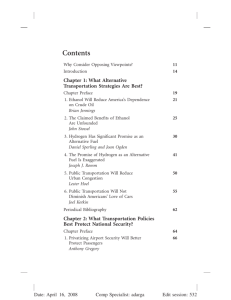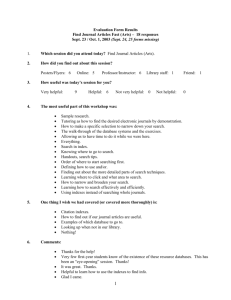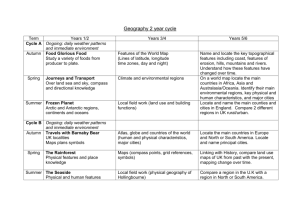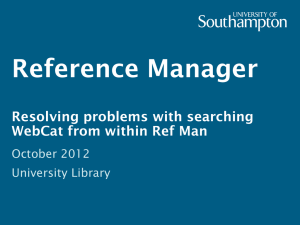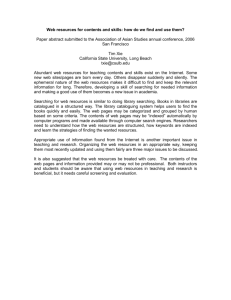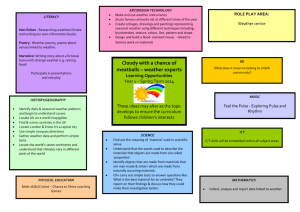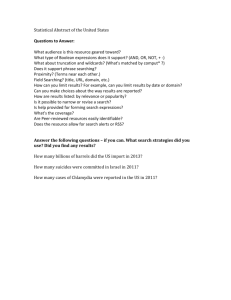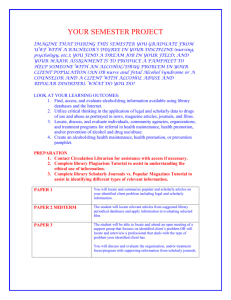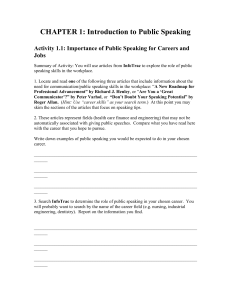PALAB 234C
advertisement
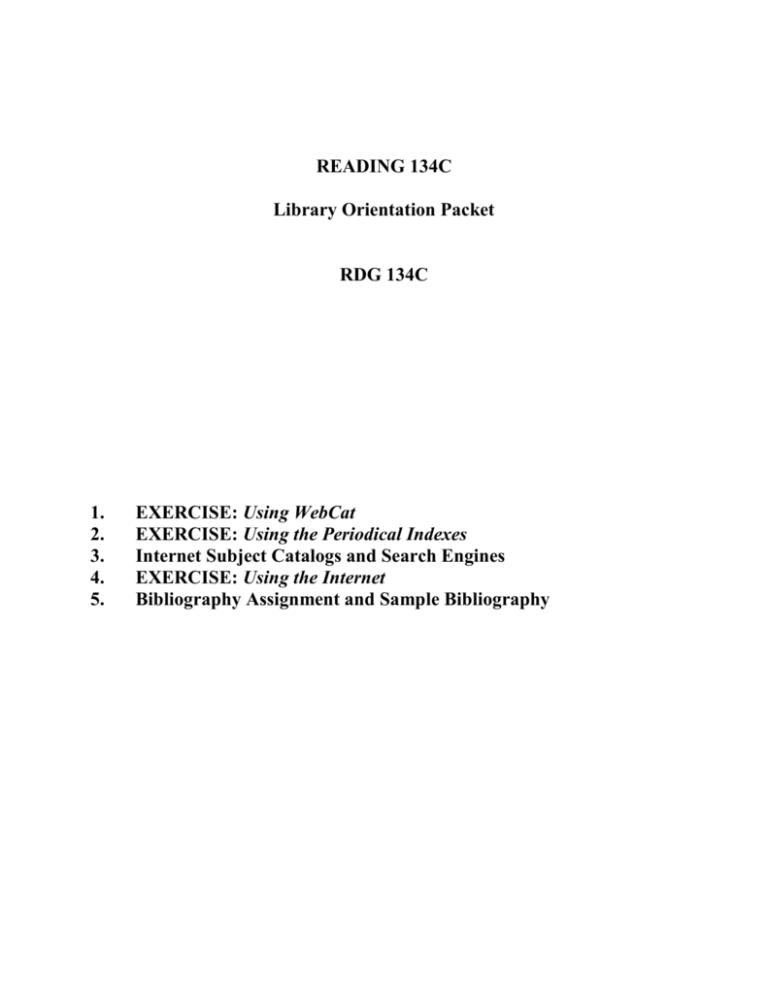
READING 134C Library Orientation Packet RDG 134C 1. 2. 3. 4. 5. EXERCISE: Using WebCat EXERCISE: Using the Periodical Indexes Internet Subject Catalogs and Search Engines EXERCISE: Using the Internet Bibliography Assignment and Sample Bibliography Using WebCat (Online Card Catalog) Author Searching (Browse). How many of Carl Sagan's books do we have? ______ In what areas of the library are they located? __________________________________ (Hint: MAIN is not an area of the library.) Print the full record screen of one of the books. (Click on View to see the full record.) Use that print to complete the following: Circle the call number and shelf location. What city was the book published in? _______________________________________________ Who is the publisher of the book?__________________________________________________ In what year was the book published?___________ How many pages are in the book?_________ Does the book have illustrations? _______ Does the book have an index? _____________ Title Searching (Browse). Who wrote the book Not All Twins are Alike?__________________ Title Searching (Keyword). Look for Not All Twins are Alike using a keyword in title search. What needs to be done to find this item when using a keyword search by title? ______________ _______________________________________ Why? _________________________ Searching Keywords in Subject vs. Everything. How many items do we have which contain: 1.) Drug Abuse in the subject? ____________ 2.) Drug Abuse anywhere in the record? ______________ Why are there more items in the second search? ______________________________________ ______________________________________________________________________________ Power Search. Use the power search screen to find a book from the Reference Collection on the subject of DRUGS. How many items do we have? _____ How many videos do we have that contain the word DRUGS anywhere in the record? _____ Use the red Library of Congress Subject Headings which are located near the WebCat computers to determine the proper subject term to use when looking for books about the DRUG INDUSTRY. Proper subject: _______________________________ How many items do we have on that subject? _________ What is one of the broader terms (BT) for the subject DRUG ABUSE? ________________________________________ Using the Periodical Indexes ______________________________________________ Choose one subject from the following list: (Or, you may use a subject that you are currently doing research for a class.) Child care Abortion Cancer Health insurance Smoking Taxes Drug abuse Women Single parents (Use InfoTrac to complete this section.) Using one of the above subjects, or one that you have chosen, locate citations in InfoTrac's Academic OneFile using the basic search. Search for your terms only in the SUBJECT. How many academic journal articles did you locate? _______ Print the first page of one of the articles. Using the same subject that you used above, again in the basic search, search for your terms using KEYWORD search. How many academic journal articles did you locate? ________ Using the same keyword search, locate articles that appeared only in Newsweek magazine. How many articles did you locate? ________ Note: If you use an electronic full text article for a research paper, you must include information about the electronic source or database in your bibliography. This is in addition to citing the original source (e.g., Newsweek). However, if you locate the original printed article and use that, you do not need to cite the electronic source. Finding a Specific Periodical We subscribe to over 17,000 periodicals. You may quickly find out if the magazine or journal that you need is available. Let’s see if we have Hastings Center Report. At the library Website, click on Research Databases. Under Research Databases, click on the link to “Periodical lists”. Then, click on “Search through the periodical collections by title or by subject”. Search for Hastings Center Report. Is it available in the library’s print collection? _______ Which years, if any, are available online? _______________________ Internet Subject Catalogs and Search Engines To find Internet documents, use one or more of the many search engines or subject catalogs that are currently available. Each one indexes different parts of the Internet and will locate different sites. Michigan ELibrary (MEL) (Subject catalog to the Internet includes premium database searching) http://mel.org (click on Featured Resources) This is very useful for locating Michigan information and for searching through several different types of resources (books, articles, Web sites) for a topic. Google (Search Engine) http://google.com This is one of our most-used search tools. It covers a large segment of the Internet and has a nice Advanced Search option. Yahoo (Search Engine) http://yahoo.com This is a search engine that also covers a large segment of the Internet. Zapmeta (Metasearch site) http://www.zapmeta.com Zapmeta is one of the many "metasearch" sites. These perform your search using several of the search engines all at the same time. They are a quick way to look for something very specific. The cost is that the unique search features of each individual search engine may not be used when using these metasearch sites. Zapmeta arranges the results into topical areas as well as by domain (.edu, .gov, .com.) Searching Tips - Meijer Library Internet Directory We have put together an Internet Web page to assist students in searching. Located under "Internet Resources" are several good sites offering search tips. Also located here are the most used search engines and subject catalogs. We regularly update this with the most useful, comprehensive searching sites. Use more than one search engine. Read the help and make use of the search engine's special features. Consider using synonyms Evaluate the results carefully...anyone can publish on the Internet Using the Internet Exercise 1. At the Michigan ELibrary site, locate the Michigan Online Resources for Educators. Click on the Social Studies link. Name one of the classifications under Social Studies. _____________________________________________ 2. Using Google or Yahoo, locate a copy of Martin Luther King's I Have a Dream speech. On what date did he deliver this speech? ______________________ 3. Using Google (Advanced Search), find information about Martin Luther King from a governmental site. Give the complete URL--or Web address--for the site: __________________________________________________________________ 4. Using Google (Advanced Search), find information about Vicodin. The document should contain the phrase “substance abuse” and either “therapy” or other synonyms for "therapy". (Use the ~ character in front of the word therapy.) Limit your search to domains that DO NOT contain .com. How many documents did you find? ____________ 5. Using Zapmeta, search for information on “antibiotics used in animal feed”. Notice the difference in the results from the various search engines. Look at only those from domains containing .edu. Under the .edu heading, click on “Human”. What two search engines are represented the most in the first five articles? __________________________________________________________________ 6. Use the five evaluation methods (authority, accuracy, objectivity, coverage, currency) to determine the research value of the following site: http://www.martinlutherking.org Would this be a good site to use for a research paper? ___________ Why or why not? _________________________________ _________________________________________________________________ _________________________________________________________________ Bibliography Assignment The research process is an essential ingredient of a successful term paper. Now that you are familiar with the online catalog, the periodical indexes, and online sources, you can demonstrate how you would use these tools in doing research for a paper. For this exercise: Choose a topic that interests you. Locate books and articles on your topic using the online catalog, the periodical indexes and the Internet. For each book, make a copy of the table of contents; for the periodical article, make a copy of the first page; for the article from InfoTrac, print the citation; for the Internet document, print the first and the last page. Using the MLA Handbook for Writers of Research Papers, construct a bibliography like the sample below. The sources should consist of 1) an article from a print periodical, 2) a reference book, 3) a book from our regular collection (stacks) or high demand collection, 4) an electronic full text article (InfoTrac), and 5) an Internet document. __________________________________________ Sample Bibliography (Works Cited page) on Welfare Reform: Works Cited “Adult Stem Cells.” Stem Cell Basics. 28 April 2009. Web. 1 March 2010. “Embryonic stem-cell.” America 201.1 (Jan. 4, 2010): 8 General Reference Center Gold. Web. 1 March 2010. Gibbs, Nancy. “Wanted Someone to Play God.” Time 3 March 2008: 68. Print. Langwith, Jacqueline. Stem Cells. Detroit: Greenhaven Press, 2007. Print. Svendsen, Clive. Encyclopedia of Stem Cell Research. 2vols. Los Angeles: Sage, 2008. Print.
